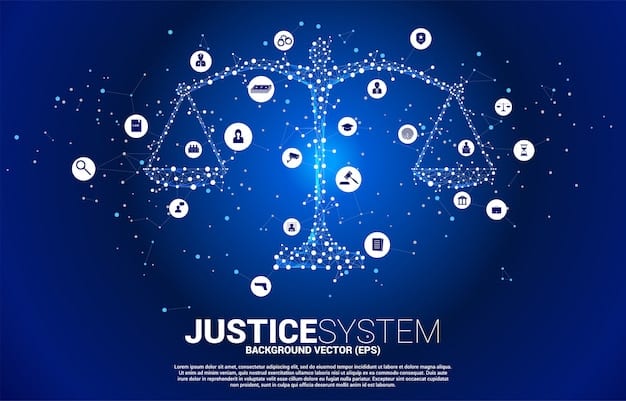New Federal AI Regulations: Impact on US Businesses in 6 Months

New Federal Regulations on AI: How Will They Impact Your Business in the Next 6 Months? outlines upcoming AI regulations in the US, focusing on compliance, potential operational and strategic shifts, and offering proactive steps for businesses to adapt and maintain competitiveness.
The dawn of artificial intelligence is upon us, bringing with it unprecedented opportunities and complex challenges. As AI technologies become more integrated into our daily lives, governments worldwide recognize the need for regulation to ensure responsible innovation, mitigate risks, and protect ethical standards. Let’s examine New Federal Regulations on AI: How Will They Impact Your Business in the Next 6 Months?
Understanding the Impending AI Regulatory Landscape
The rapid advancement of AI has prompted governments to consider regulatory frameworks to manage its potential impact. These regulations are designed to address concerns related to bias, transparency, security, and accountability. Understanding the proposed and impending regulations is crucial for businesses to prepare for the changes ahead.
Key Areas of Focus in AI Regulations
Upcoming AI regulations are expected to focus on several key areas, including data privacy, algorithmic transparency, and accountability for AI-driven decisions. By understanding these key areas, businesses can better prepare for compliance.
- Data Privacy: Ensuring that AI systems comply with data protection laws, such as GDPR and CCPA, is crucial.
- Algorithmic Transparency: Regulations may require businesses to disclose how AI algorithms make decisions, especially in sensitive areas.
- Accountability: Establishing clear lines of responsibility for the actions and decisions made by AI systems.
Keeping abreast of these focus areas will allow your business to stay ahead of the compliance curve, ensuring operations are ethical and aligned with the law.
Anticipated Compliance Requirements and How to Prepare
Complying with new AI regulations may involve significant changes to business processes and technology infrastructure. It’s essential to understand what actions will be expected and how to prepare for them.

Steps to Ensure Regulatory Compliance
To ensure compliance, businesses can take a proactive approach by conducting thorough assessments, developing detailed compliance plans, and implementing ongoing monitoring and auditing systems.
- Conduct a Risk Assessment: Identify potential risks associated with your AI systems and develop mitigation strategies.
- Develop a Compliance Plan: Outlining the policies and procedures that will ensure compliance with AI regulations.
- Implement Monitoring Systems: Regularly monitor your AI systems to detect and address any compliance issues.
By taking these steps, organizations can minimize the risk of regulatory penalties and maintain their reputation.
Operational and Strategic Shifts Businesses May Face
New AI regulations may require businesses to make significant operational and strategic shifts. These changes can affect everything from product development to marketing and customer service.
Rethinking Business Strategies in an AI-Regulated World
Businesses may need to rethink their strategies to align with new regulations. This could involve changes to product development, marketing, and customer service.
- Product Development: Ensuring that new AI products comply with regulations from the outset.
- Marketing: Avoiding deceptive or misleading AI-driven marketing practices.
- Customer Service: Providing transparency and accountability in AI-powered customer service interactions.
By adapting their strategies, businesses can maintain a competitive edge while complying with regulations.
Industry-Specific Implications of Federal AI Regulations
The implications of federal AI regulations vary across different industries. Healthcare, finance, and transportation, for example, may face unique challenges and requirements.
Healthcare, Finance, and Transportation Sectors
Each industry faces distinct challenges, requiring tailored compliance strategies.
Healthcare
Ensuring the privacy and security of patient data in AI-driven diagnostics and treatment plans.
Finance
Addressing bias and fairness in AI-driven lending and investment decisions
Transportation
Guaranteeing the safety and reliability of autonomous vehicles and AI-driven traffic management systems.

Proactive Steps Businesses Can Take to Prepare
Businesses can take several proactive steps to prepare for new AI regulations. These efforts can include investing in AI ethics training, establishing AI governance frameworks, and engaging with regulatory bodies.
Investing in AI Ethics and Governance
Ethics training and governance frameworks are essential for ensuring responsible AI development and deployment.
- AI Ethics Training: Educating employees about the ethical implications of AI.
- AI Governance Frameworks: Establishing clear policies and procedures for AI development and deployment.
- Engaging with Regulators: Participating in discussions with regulatory bodies to shape the future of AI regulation.
The Role of Technology in Facilitating Compliance
Technology can play a crucial role in helping businesses comply with new AI regulations. AI-powered compliance tools, data governance platforms, and cybersecurity solutions can streamline compliance efforts and reduce the risk of regulatory penalties.
AI-powered compliance tools can automate many of the tasks associated with regulatory compliance, such as data mapping, risk assessment, and monitoring. Organizations can ensure their AI technologies are secure, transparent, and ethical by using reliable platforms and advanced solutions. This is especially useful in an era where AI regulations are constantly updated.
| Key Area | Brief Description |
|---|---|
| 🛡️ Compliance | Adhering to new AI regulations to avoid penalties. |
| 🔄 Strategic Shifts | Adjusting business strategies for AI governance. |
| 🏢 Industry Impact | Varying implications across healthcare, finance, and transportation. |
| 🤖 Tech Solutions | Using AI and cybersecurity tools for compliance. |
FAQ
▼
The main goals are to ensure responsible innovation, mitigate risks, and protect ethical standards in the development and deployment of AI technologies across various sectors.
▼
Businesses can prepare by conducting risk assessments, developing compliance plans, implementing monitoring systems, and investing in AI ethics training for their employees.
▼
Healthcare, finance, and transportation are among the most likely industries to be affected, due to the sensitive nature of data and critical decisions often involved in these sectors.
▼
Businesses may need to rethink product development, marketing strategies, and customer service approaches to align with new regulatory requirements, ensuring transparency and accountability.
▼
Technology solutions like AI-powered compliance tools, data governance platforms, and cybersecurity solutions are crucial for streamlining compliance efforts and reducing the risk regulatory penalties.
Conclusion
As we look towards the next six months, understanding and preparing for new federal AI regulations is essential for businesses in the US. Taking proactive steps now can enable organizations not only to comply with impending regulations but also to position themselves as leaders in responsible and ethical AI innovation.





